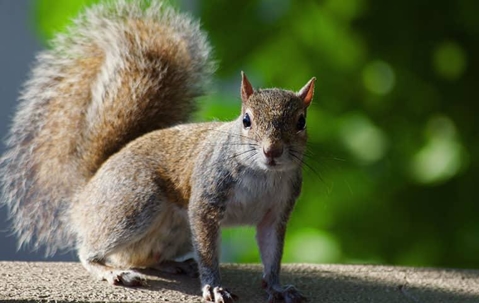In Westchester, there are lots of wildlife animals that have the ability to break into homes. Among these are bats, raccoons, and squirrels. Each of these pests brings their own set of problems and concerns. Attics, sheds, garages, and underneath porches are all areas that wildlife may consider their home this fall, so it’s important to pay attention to these particular areas. Here’s what you need to know about each pest:
Bats
Black or brown in color, bats have furry bodies and leather-like wings. Being nocturnal, you’ll notice their nearly silent swooping at night. Bats enjoy roosting in homes and buildings and fall is prime time for them to enter in and find a place for the winter. Bats are important members of our ecosystem, but when they enter homes and other buildings, they become a health and property-damage threat. They’re capable of spreading rabies if you come in physical contact with one that’s infested. Histoplasmosis, which is a serious lung disease, may be spread from bat feces. Bats won’t usually attack humans, but when feeling threatened they will bite in defense. On top of this, these pests can cause structural damage when entering in and out of your home. They can also bring in other pests such as fleas, mites, and ticks.
Raccoons
Raccoons are a medium-sized mammal, well known for the black mask of fur around their eyes, and also for eating a wide variety of food, including just about anything they find in your trash. This is usually what brings them onto your property. Easy access to your trash or other foods will lure them in. Cold weather may also bring them inside. And if these raccoons stay for the winter, they’re likely to have a larger population on your property in the spring. Then you’ll be dealing with a whole family of hungry raccoons. These pests are damaging to property, both inside and out, and they’ll likely leave trash spread out over the yard a time or two. Raccoons are very aggressive and will leave scratches and bites when feeling threatened. They are also carriers of rabies.
Squirrels
Squirrels are usually gray in color and are easily distinguished by their large, bushy tails. They’re attracted to homes for their warmth during the cooler months. Like other wildlife, if not eradicated in the fall, you’ll likely have a larger population come spring time. Being rodents, squirrels can cause a lot of damage to your home by their chewing and scratching. Anything in their way can be at risk for destruction; wires, insulation, drywall, etc. They’re known to carry a variety of diseases as well and can bring in other pests such as fleas, ticks, and mites.
It’s important to set some prevention practices in place to keep these pests from entering during the fall. Here are some tips:
- Seal all cracks and openings found around the exterior of your home and replace missing shingles.
- Install screens in windows and doors, and replace damaged ones.
- Remove sources of water around your property.
- Keep grass mowed regularly and trim back bushes and branches that are near your home. Squirrels are excellent jumpers and can cross large gaps.
- Keep trash sealed tightly and stored away from your home.
- Make sure the chimney has a cap on it.
- Pick up any uneaten pet food served outside.
- Keep bird feeders a safe distance from your house.
The best and safest way to eradicate wildlife infestations is to call a professional. At Parkway Pest Services, our technicians are well trained and experienced in removing bats, raccoons, squirrels, and other wildlife safely. We have emergency services and can be there the same day or the very next day to eliminate your pest problems. We are Green Pest Control and use Integrated Pest Management (IPM) techniques. This means we only use chemicals as a last resort, so our removal techniques are safe for you and your family. Get in touch with us today and let us help you with your pest problems.

